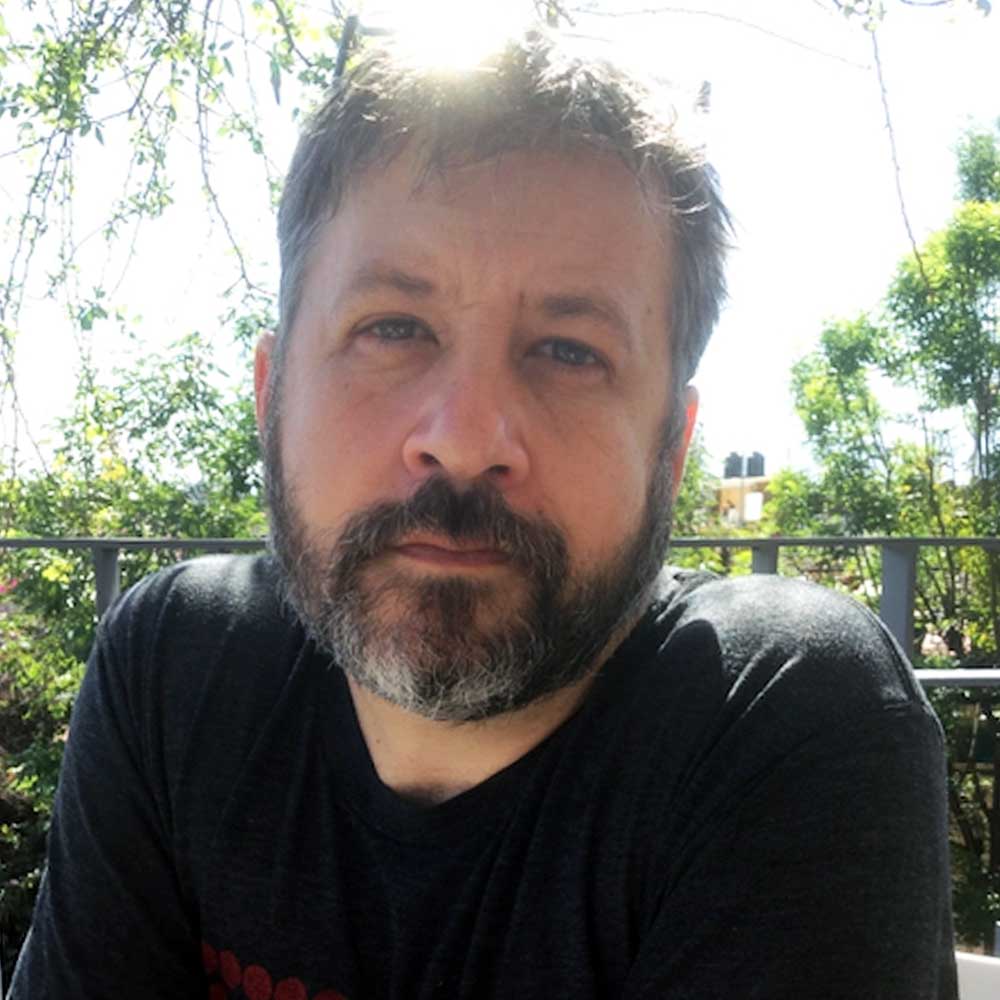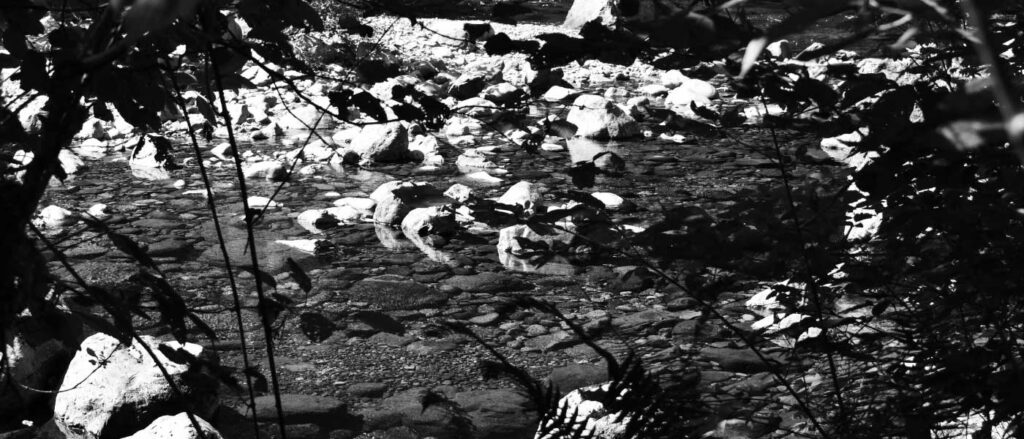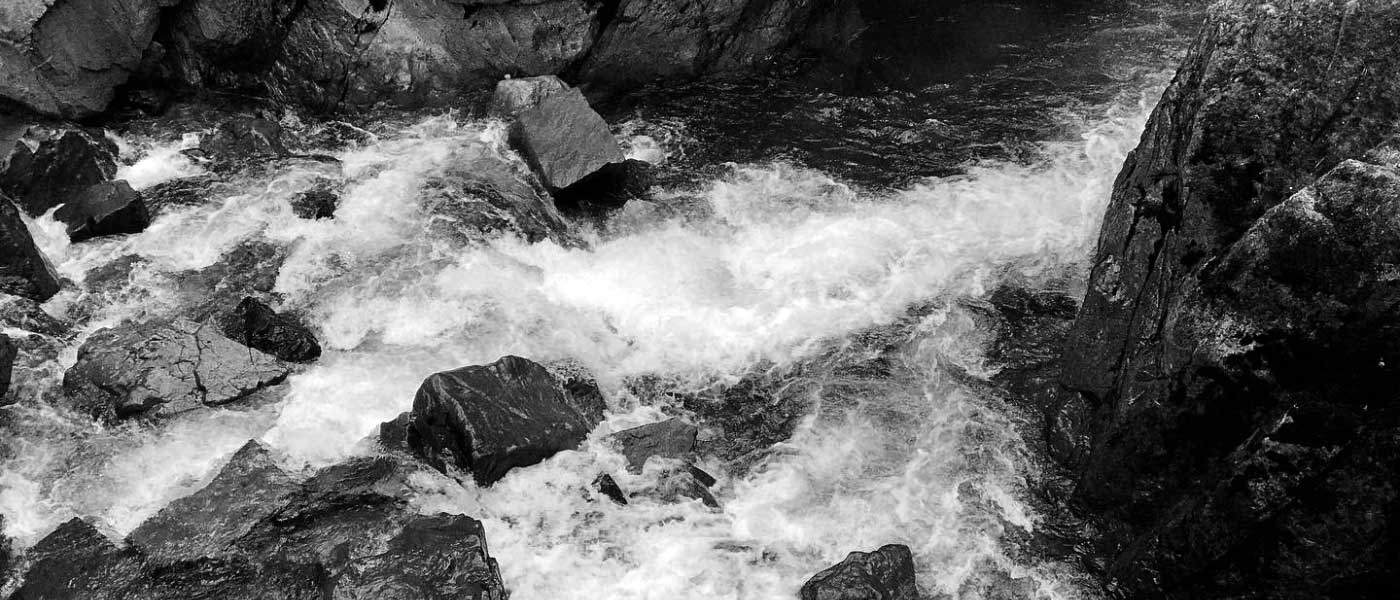It will come that every living creature which swarms in every place where the river goes, will live. And there will be very many fish, for these waters go there and the others become fresh; so everything will live where the river goes.
Ezekiel 47:9
There is a river, lost or hidden, that is impossible to pass six days each week. The force of its waters hurls stones. Or the river is a river of stones, a torrent of stones and sand. Maybe it is a volcano, some say, unable to imagine this river. Maybe it is a spring.
Some say the river is as wide as a bow can shoot an arrow. Others say it is many miles across, seventeen, and that its waters both cure disease and throw stones as tall as a tower. That on the day it does not flow it resembles an inland sea, a sea of snow, a sea of sand. That if one gathers and bottles some of this sand, the sand will be restless for six days each week, agitating itself against the glass every day but one.
The stones in this river of stones or this river of water, can be heard a half-day away and sound like a storm, like an ocean, like the roar of waves, like the howl of wind over water. But one day a week the river is quiet, and does not flow. Certain fish, on that day, draw close to the shore, and refuse to swim. They—like the sand, like the water—are quiet and rest.
There are a people, lost or hidden, that will not cross this river. They cannot six days a week. They will not on the one day they could.
Some say it is the lost tribes of Israel, all ten, or four, who live on the other side of the river. That the river is in Persia, in India, in Ethiopia. That it is south of the Caspian sea. That the lost Jews are in Pakistan, in China, in Syria, in Russia. That they are warriors of tremendous height.
Some medieval Germans believed a legendary Jewish nation of “Red Jews” lived beyond this river. Red-bearded and red-clothed warriors with flushed red faces who would eventually invade Europe and threaten Christianity during the tribulations near the end of the world.
Others believed that across the river are the descendants of Moses himself. That during Babylonian captivity, it was demanded of them to stand before Babylon’s sacred statues and perform the songs the Israelites used to sing in their now destroyed Temple. The children of Moses, instead, so they could not play their own harps, cut off their own thumbs. Many of these Israelite priests were slaughtered, their bodies heaped in mounds. But a cloud descended and a pillar of fire guided the survivors to a place where this river, called Sambatyon, could be stretched around them.
In Portugal, the secret Jews of Lisbon were alerted each Friday afternoon—by a man walking through the city holding up a glass vessel of jumping sand and stones—that the Sabbath was coming. A sign for the converso Jews, the Jews hiding as Christians, to jump up and close their shops. These were not the lost Jews. Not those lost Jews.
Roman senator and provincial governor of Judea, Turnus Rufus the Evil, once asked Rabbi Akiva how do you know which day is the Sabbath? Maybe it’s another day. Reb Akiva replied: the River Sambatyon. We rest when it rests. Thus, the Jews on the other side of the Sambatyon will not cross it on the day that it is quiet. For they too must rest.
In Ancient times, the Sabbath started before the Sabbath started. Three blasts of the shofar were followed by the lighting of the Sabbath candles, the sun not yet set. Everyone would then wait— the time it took to roast a small fish—before three more shofar blasts sanctified time. Only when three stars appeared in the sky the following night would time move forward again.
“There is a realm of time where the goal is not to have but to be, not to own but to give, not to control but to share, not to subdue but to be in accord. Life goes wrong when the control of space, the acquisition of things of space, becomes our sole concern.” said Rabbi Abraham Joshua Heschel, author of The Sabbath.
“We should not say that one man’s hour is worth another man’s hour, but rather that one man during an hour is worth just as much as another man during an hour. Time is everything, man is nothing: he is at the most time’s carcass” said the descendent of a long and storied line of rabbis on both sides of his family, Karl Marx.
The time of the soul is not the time of the calendar. The Jewish New Year does not begin at the beginning of the year but on the new moon at the beginning of the seventh month. The calendar does not start anew, the soul does.
The first day of the seventh month is also called a day of rest. But during this day Jews leave their cities to go to a river. They go to a river to perform Tashlich, the throwing of breadcrumbs into the water, the release of one’s transgressions and regrets. They leave the city to do this because in the Middle Ages the custom of Tashlich was used to accuse Jews of casting a spell over the water, even poisoning it through incantation.
The word ‘to rest’ in Biblical Hebrew, shavat, gives rise in the Middle Ages to the word shevitah, referring to the things one must refrain from in order to rest. Shevitah in modern Hebrew has now also come to mean “to go on strike.”
There is a mandate in the Bible that comes even before the mandate to rest each week. Shmita. Shmita occurs every seventh year as a sabbath for the land.
“Six years you shall sow your land and gather in its produce, but the seventh year you shall let it rest and lie fallow, that the poor of your people may eat; and what they leave, the beasts of the field may eat. In like manner you shall do with your vineyard and your olive grove.”
Shmita was of such importance that the Prophet Jeremiah declared that the exile of the Israelites was because of this very thing, their regular violation of shmita. Moses Maimonides agreed. The four grave things that could cause exile were idolatry, murder, incest, and the violation of shmita.
Some say the laws of shmita only apply to those living in Israel. And yet when significant numbers of Jews began to settle there again in the 19th century, rabbinical authorities came up with a cheat, heter mechira, where Jews could sell their land, for the length of the shmita year, to non-Jews, and then work the land as employees. In other words, the land never rested. In other words, the poor of the people did not eat what lie fallow in this land. In other words, the beasts of the never-rewilded field did not eat from the never-resting land.
1.3 billion cubic meters of water used to flow through the lower Jordan River, but now it is only 2% of that. The majority of what remains is diverted for human use by Israel, Syria and Jordan, each taking what they can before the other. The Six Day War was partly started over this battle. Untreated sewage and chemicals from agricultural fertilizer have decimated its ecosystem.
Some say there are a people trapped behind the west bank of this river. Trapped yet prohibited from accessing it. From accessing it or fresh water springs. That these people are not allowed to drill new water wells or deepen existing ones. That even the collection of rainwater is controlled by another there, their own cisterns often destroyed as punishment. That hundreds of these communities have no access to running water. That they endure somehow, improbably, by consuming a mere 73% of the recommended daily water minimum. Yet their neighbors, living sometimes in communities that sit side by side with theirs, consume four times more than this.
Which came first, the unquenchable thirst or the river of stones?
Reb Palache of Oruro, in the Hebrew year 5831, gathered his followers along the banks of the Kachi Mayu, on the new moon of the seventh month. A shmita year. For the six years before they anticipate it. They know debts will be forgiven this year, and yet some will suffer who were owed a great deal. They know others have experienced crop spoilage and will also need to be helped through the year ahead, but they have planned and imagined for this day. For all of this. For years now. Their neighbors too know of their ways. Some connect them to their own practices—of rotation of crops in seven-year cycles.
Tell us the story of the return of the waters, they ask him. He has told them before of Joseph’s dream, of seven years of plenty followed by seven years of famine. How he helped, not his own people, but the Egyptians, filling their granaries in anticipation. Peoples of every sort came from around the region, including his own family, his own brothers, to Egypt when they needed food. And for the six years before the shmita, Reb Palache’s community feeds its neighbors, invites them to their fields and their table, goes to theirs.
But he knows this is the result not the cause of the return of the waters. That the boundless thirst had to be broken. That it wasn’t rest that returned them to rest. But something else.
Tell us of the strike, they say. But his mind is elsewhere, his eyes briefly blinded by a flash of sun. A flash of sun glinting off an iridescent scale, of a fish briefly soaring out of the water.
Reb Soomekh of Jisr az-Zarqa, in the Hebrew year 5796, had gathered her followers along the banks of the Nahal Taninim, on the new moon of the seventh month. A shmita year. Their first attempt at an enactment of a new ritual, a shmita seder, a mere three years since the end of the shevitah, the strike.
It had been too soon. Too soon for a shared ritual, the land so newly federated. Yes, they had joined the strike, improbably started by one remarkable woman, Sheikha Mariam of Musmus. But even as they came together for the seder, it was as if they were on opposite sides of the river. They could not share their stories, they could not mourn their respective dead together.
This year, the Hebrew year 5803, a shmita year once again, their second shmita seder, they meet closer to Musmus, along the banks of the estuary of the Kishon river, now called Nahr el-Mokatta once again. They keep their distance from the water which still can result in chemical burns, despite the closing of the factories nearly a decade ago. Yet the great cormorants are returning, their astonishing green-blue eyes watching them.
The six cups on the seder plate represent the six elements of the shmita year. They decide this year to focus on the sixth, on otzar, The Commons. The otzar cup holds several dates and is surrounded by many more, split and opened, lying among honey-soaked almonds and pistachios. This isn’t the first time they’ve shared rituals in their respective traditions since the first shmita. And yet it is stilted still. Reb Soomekh and Sheikha Mariam have decided in advance there will be no speaking this year. Everyone will stuff an opened date for another. They will sing together, wordless melodies. They will be together, cup by cup, without words.
It is the new moon, on the first day of the seventh month, of the Hebrew year 5845. A shmita year. Rehabiah ben Eliezer and his kinsmen have gathered, as they do every week, at the banks of the river, each time it stops. But this isn’t merely the weekly shavat, for them and the waters both. Nor is it merely the restoration they seek on the seventh month each year; nor the renewal of shmita every seven. This year is the Jubilee year, the seventh cycle of shmita, the seventh cycle of shmita since the strike.
There are no leaders, there are no followers among them. And yet it is often Rehabiah who they ask to speak. They recline on their sides by the water, so impossibly still. Rehabiah strokes his red beard as he drags his hand in the water which does not rush against it. He takes in the silence, which seems so loud after the roar of the last six days, the last six years, the last forty-eight. They want his stories but he is tired, not by the number of times they’ve been told, but of stories at all. And the ways they direct and point and move and flow.
His fingertips find the top of a rock in the water, and beside it a Sabbatian fish floating without aim. At first Rehabiah places his four fingers to one side of the fish, and his thumb to the other, holding it, grasping it, if lightly; feeling its alien coolness, so different from the ruddiness of his people. He tucks his thumb across his palm, thinking of his thumbless ancestors, thinking of what a hand might be for if it cannot grab. His fingers dangle in the water like fronds of lake grass, the fish bumping up against them without purpose, here and there and here again.
He looks across this river, which looks now like a lake, or an inland sea. He looks across the bodies of his now sleeping brethren, across the body of water with nowhere to be. He lets his mind travel across it. He feels his hand become cool like the fish, and he lets it become cooler still. He thinks of the six years they planned for this, what they might do in the six years after. He reels his mind back in, to his hand, to the fish, to the river they will never cross. And he says to no one: release, shmita means ‘release.’




